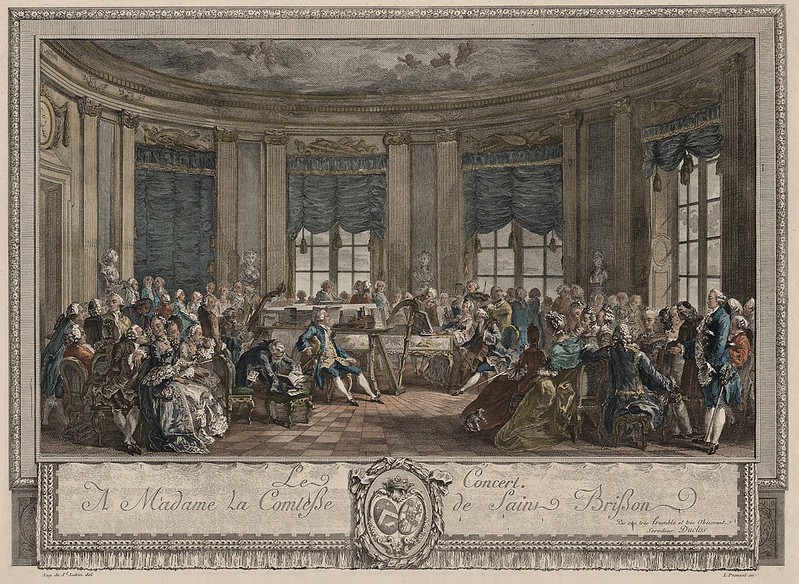Anton Schweitzer (1735-1787)
- Sinfonia (D-Dur) à 6 voci (c.1782)
Performers: Thüringen PhiIharmonie; Hermann Breuer (conductor)
Further info: Schweitzer : Arias et Oeuvres Orchestrales
---
German composer. As a young man he served the Duke of Hildburghausen as
chamber musician. To groom him in composition, the duke sent him to
Bayreuth (1758) and later Italy (1764-66), after which he promoted him
to Kapellmeister. When financial pressures forced the duke to dissolve
his opera company in 1769, Schweitzer found employment as music director
of the itinerant theatrical company of Abel Seyler, which was just
beginning to add German operas to its spoken offerings. Schweitzer’s
first work for the Seyler company, the one-act occasional piece Elysium
(1770), gained considerable popularity as a musical afterpiece and was
published in vocal score in 1774. He composed other celebratory pieces
on mythological themes, but also comic operas. Seyler sent his music
director on an expedition to recruit new singers in order to expand and
elevate his musical productions in directions towards which Schweitzer’s
music clearly pointed. By a stroke of good fortune, the music-loving
Duchess Anna Amalia of Saxe-Weimar engaged Seyler’s company at this time
(1771), and Schweitzer’s ambitions were at last given full rein. A
heated rivalry with the duchess’s leading musician (later
Kapellmeister), Ernst Wilhelm Wolf, flared up immediately. Through a
series of bold new works composed in collaboration with major writers,
Schweitzer quickly established himself as the superior figure. While
Wolf continued composing the Hillerian comic operas in which the duchess
delighted, Schweitzer turned to the witty, more urbane tone of F.W.
Gotter’s farce Die Dorfgala (1772). On a more elevated plane, he
composed not only celebratory dramas but also several dramatic ballets
for the birthdays of the duchess and her sons, Karl Eugen and
Konstantin. Two other experiments at Weimar opened new vistas for the
German theatre. In May 1772 the Seyler company gave the première of the
first German melodrama, Schweitzer’s setting of a translation of
Rousseau’s Pygmalion.
A year later it was able to mount a serious five-act opera in German,
Christoph Martin Wieland’s Alceste, the achievement for which Schweitzer
is chiefly remembered. Theatrical collaboration between Schweitzer and
Wieland had begun in mid-1772 with the dramatic ballet Idris und Zenide
and continued that year with two dramatic prologues of Metastasian
stamp, Aurora and Die Wahl des Herkules. When Wieland proposed the
Alceste project to the duchess, he insisted that Schweitzer and not Wolf
compose it. A brilliant success at Weimar, Alceste made its way quickly
to many other German stages, establishing at a stroke seria-style opera
in German as a musical reality. After Alceste Schweitzer began work on a
new melodrama, Ariadne auf Naxos, adapted from a cantata text by H.W.
von Gerstenberg by a member of the Seyler company, Johann Christian
Brandes, in order to display the talents of his wife Charlotte. The work
was only partly complete when a fire destroyed the Hoftheater at Weimar
in May 1774. The Seyler troupe, by now one of the most respected in
Germany, was immediately engaged by Duke Ernst II at the nearby court of
Gotha. There Schweitzer found a far more formidable rival than Wolf in
the court Kapellmeister Georg Benda. Benda supplanted Schweitzer almost
immediately as the chief purveyor of important new dramatic
compositions. Schweitzer’s main compositional challenge during these
years came from elsewhere. The success of Alceste in 1775 at
Schwetzingen and Mannheim prompted the Palatine court to commission
another serious opera from Wieland and Schweitzer in 1777. He remained
in Gotha as Benda’s successor after the latter resigned as the duke’s
Kapellmeister in 1778. The Hoftheater was disbanded in September of the
following year. Early in 1780 Benda remarked acidly in a letter to the
composer F.W. Rust: ‘For the labours one now demands of a Kapellmeister
here my successor Schweitzer is quite good, for he has nothing to do and
does just that’.

Cap comentari:
Publica un comentari a l'entrada